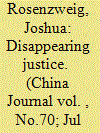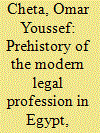|
|
|
Sort Order |
|
|
|
Items / Page
|
|
|
|
|
|
|
| Srl | Item |
| 1 |
ID:
122316


|
|
|
|
|
| Publication |
2013.
|
| Summary/Abstract |
The 2011-12 revision of China's Criminal Procedure Law marked the first changes to the country's "mini-constitution" in 15 years, and the first time that proposed revisions were presented for public consultation. During the consultation period, lawyers, journalists and members of China's online communities criticized the draft's inadequacies, particularly measures that would allow investigators to "disappear" certain suspects. The debate over "secret arrest" revealed an emerging public discourse about justice issues, featuring an increasingly sophisticated understanding of the relationship between law and government accountability. Concern over police abuses is reorienting public opinion toward a justice discourse rooted in rights-protective procedures and institutions, that departs significantly from the rationales for criminal procedure reform articulated by China's politicolegal authorities. So long as those authorities treat legislative reform as a "contest" between institutional stakeholders and fail to engage with the public discourse, mistrust of public authority and demands for justice are likely to grow.
|
|
|
|
|
|
|
|
|
|
|
|
|
|
|
|
| 2 |
ID:
154990


|
|
|
| 3 |
ID:
163689


|
|
|
|
|
| Summary/Abstract |
Ideally, justice is a universal good: the law protects equally the rights of the rich and powerful, the poor and marginal. In reality, the major share of legal services goes to business entities and wealthy people and the prestige and prosperity to the lawyers who serve them. This essay deals with the history of access to justice–chiefly civil justice–and with the role of lawyers and organized legal professions in promoting and restricting that access. In the last century, legal professionals and others have taken small steps to provide access to legal processes and legal advice to people who could not otherwise afford them. By doing so, they have inched closer to the ideals of universal justice. Though the organized bar has repeatedly served its own interests before those of the public, and has restricted access to justice for the poor, it has been a relatively constructive force.
|
|
|
|
|
|
|
|
|
|
|
|
|
|
|
|
| 4 |
ID:
163879


|
|
|
|
|
| Summary/Abstract |
This article examines the emergence of a new corps of legal practitioners in Egypt during the 1860s and early 1870s. The proceedings of hundreds of merchant court cases in mid-19th-century Cairo are replete with references to deputies and agents (wukalā; sing. wakīl) who represented merchant-litigants in a wide range of commercial disputes. Examining how these historical actors understood Egyptian, Ottoman, and French laws, and how they strategically deployed their knowledge in the merchant courts, this article revises the commonly accepted historical account of the founding of the legal profession in Egypt. Specifically, it argues that norms of legal practice hitherto linked to the establishment of the Mixed Courts in 1876 were already being formed and refined within the realm of commercial law as part of a more comprehensive program of legal reforms underway during the middle decades of the 19th century. In uncovering this genealogy of practice, the article reevaluates the extent to which the khedival state shared a legal culture with the Ottoman center, and, simultaneously, created the space for a new form of legal representation that became ubiquitous under British, and, subsequently, postcolonial rule.
|
|
|
|
|
|
|
|
|
|
|
|
|
|
|
|
|
|
|
|
|